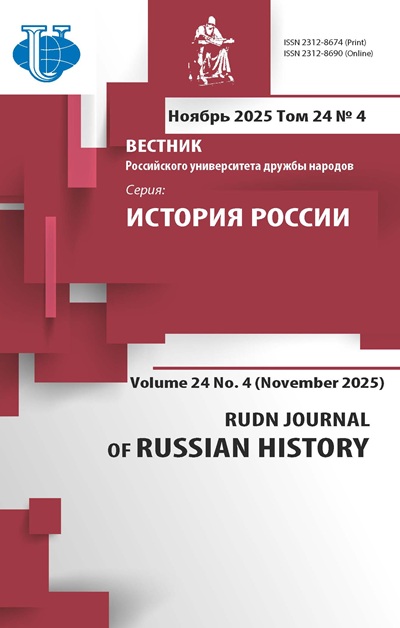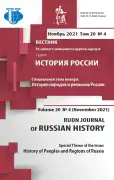The transfer of state functions in the field of physical culture and sports to public organizations in the 1960s
- Authors: Bogolyubov E.A.1
-
Affiliations:
- Kemerovo State University
- Issue: Vol 20, No 4 (2021): History of Peoples and Regions of Russia
- Pages: 588-599
- Section: ARTICLES
- URL: https://journal-vniispk.ru/2312-8674/article/view/321808
- DOI: https://doi.org/10.22363/2312-8674-2021-20-4-588-599
- ID: 321808
Cite item
Full Text
Abstract
The article examines public organizations that functioned and performed state functions in the field of physical culture and sports. Special attention is paid to previously little-studied issues of interaction of the Union of Sports Societies and Organizations of the USSR with state bodies. The source base of the article is the normative legal acts regulating the activities of this organization, as well as documents of the Kaliningrad regional Union of Sports Societies and Organizations that were not previously introduced into scientific circulation. The liberalization of public life during the Thaw period had a significant impact on the position of public organizations in the Soviet political system. The scientific literature of that time actively discussed the issues of involving citizens and public organizations in solving the problems facing the country. One form of such involvement was the transfer of state functions to public organizations. As a result, public organizations were able to make important decisions in a certain segment of the public sphere. The Union of Sports Societies and Organizations of the USSR became a unique organization that completely replaced the state body in the field of physical culture and sports. Based on the material studied, the author comes to the conclusion that the liquidation of the Union of Sports Societies and Organizations of the USSR in 1968 coincided with other processes aimed at curtailing liberal principles in the USSR. Almost 10 years of activity of this organization have shown that the transfer of state functions into the hands of the public is indeed possible.
About the authors
Egor A. Bogolyubov
Kemerovo State University
Author for correspondence.
Email: bogolubovegor@mail.ru
ORCID iD: 0000-0002-9312-7793
Assistant Lecturer, Department of Theory and History of State and Law
6, Krasnaya St., Kemerovo, 650000, RussiaReferences
- Agergaard, S., la Cour, A. “Governing Integration Through Sports.” Nordic Journal of Migration Research 2, no. 1 (2012): 26-34. https://doi.org/10.2478/v10202-011-0024-y
- Aliyev, H. Post-Communist Civil Society and the Soviet Legacy: Challenges of Democratisation and Reform in the Caucasus. Basingstoke: Palgrave Macmillan, 2015. https://doi.org/10.1057/9781137489159
- Amirov, I.M. “Sports law and order in Russia and abroad.” RUDN Journal of Law, no. 4 (2014): 390-399 (in Russian).
- Dolmatova, T.V., Zubkova, A.V., Selezneva, E.A., and Puhov, D.N. “Organization of physical activity and mass sports at local governmental level: comparative analysis of foreign experience.” Theory and Practice of Physical Culture, no. 12 (2019): 53-55 (in Russian)
- Giulianotti, R., Itkonen, H., Nevala, A., and Salmikangas, A.-K. “Sport and Civil Society in the Nordic Region.” Sport in Society 22 (2017): 1-15. https://doi.org/10.1080/17430437.2017.1390906
- Grant, S. Physical Culture and Sport in Soviet Society: Propaganda, Acculturation, and Transformation in the 1920s and 1930s. New York: Routledge, 2013.
- Grigorkevich, A., Saktaganova, Z., and Trevicsani, T. “Russian Historiography of the History of Development of Physical Culture and Sports in Everyday Life of the Soviet People in the Second Half of the XX century.” Bulletin of the Karaganda university History. Philosophy series 86, no. 2 (2017): 32-37 (in Russian)
- Groeneveld, M. “European Sport Governance, Citizens, and the State. Finding a (Co-) Productive Balance for the Twenty-First Century.” Public Management Review 11, no. 4 (2009): 421-440. https://doi.org/10.1080/14719030902989516
- Hasmath, R., Hildebrandt, T., and Hsu, J.Y.J. “Conceptualizing Government-Organized Non-Governmental Organizations.” Journal of Civil Society 15 (2019): 267-284. https://doi.org/10.1080/17448689.2019.1632549
- Ibsen, B., and Levinsen, K. “Collaboration between Sports Clubs and Public Institutions.” European Journal for Sport and Society 16, no. 2 (2019): 187-204. https://doi.org/10.1080/16138171.2019.1610619
- Killingsworth, M. “Opposition and Dissent in Soviet Type Regimes: Civil Society and its Limitations.” Journal of Civil Society 3, no. 1 (2007): 59-79. https://doi.org/10.1080/17448680701390745
- Korzhikhina, T.P. Sovetskoe gosudarstvo i ego uchrezhdeniya: noyabr' 1917 g. - dekabr' 1991 g. Moscow: RSUH Publ., 1995 (in Russian).
- Leitch, D. “Society in Motion: Russia’s Emerging Voluntary Sector.” Nonprofit Management and Leadership 7, no. 4 (1996): 421-433. https://doi.org/10.1002/nml.4130070407
- Mukhamatulin, T.A. “ ‘Serious fun’: soviet sport in contemporary historiography.” The Historical Expertise, no. 1 (2020): 356-365 (in Russian).
- Nurdygin, E.A., and Koroleva, L.A. “Phizicheskaya kul'tura i sport na sele v respublikah SSSR v seredine 1960-kh gg.” Obrazovanie i nauka v sovremennom mire. Innovatsii 17, no. 4 (2018): 97-105 (in Russian).
- Nurdygin, E.A., Koroleva, L.A., Davydov, A.S. et al. Gosudarstvennaia politika v sfere fizicheskoi kul'tury i sporta v SSSR. 1945-1959 gg. (po materialam Penzenskoi oblasti). Penza: PGUAS Publ., 2015 (in Russian).
- Østerlund, K., and Seippel, Ø. “Does Membership in Civil Society Organizations Foster Social Integration? The Case of Danish Voluntary Sport Organizations.” Journal of Civil Society 9, no. 4 (2013): 391-413. https://doi.org/10.1080/17448689.2013.847548
- Ponkina, A.I. “Avtonomnost' sporta kak teoretiko-pravovaya problema.” Pravo i sovremennye gosudarstva, no. 1 (2013): 24-38 (in Russian).
- Ponkina, A.I. “Theoretical and legal fundamentals of interpretation of automation of sport.” Obrazovanie i pravo, no. 3 (2013): 69-78 (in Russian).
- Sarycheva, T.V. Sovetskaia sistema fizicheskoi kul'tury kak sotsiokul'turnyi fenomen XX veka (na primere Zapadnoi Sibiri, 1920-1991 gg.). Tomsk: Pechatnaia manufaktura, 2019 (in Russian).
- Savenkov, N.T. “Some Issues Related to the Implementation of the functions of Governing Bodies by the Permanent Commissions of Local Councils.” Uchenye zapiski. Vsesoyuznyy nauchno-issledovatel'skiy institut sovetskogo zakonodatel'stva 3, no. 20 (1964): 58-78 (in Russian)
- Seippel, O. “Sports in Civil Society: Networks, Social Capital and Influence.” European Sociological Review 24, no. 1 (2007): 69-80. https://doi.org/10.1093/esr/jcm035
- Sorokina, O.G. “Studencheskoe sportivnoe obshchestvo «Burevestnik»: stanovlenie i razvitie v Chuvashskoj ASSR.” Vestnik Chuvashskogo Universiteta, no. 3 (2007): 59-63 (in Russian)
- Sotnikov, M.G. “Development of voluntary sports societies of Stalingrad in the 1946-1951 (based on the materials of Documentation Centre of the Modern History of the Volgograd Region).” Ivzestia of the Volgograd State Pedagogical University, no. 9-10 (2015): 213-219 (in Russian)
- Sunik, A. Ocherki otechestvennoy istoriografii istorii fizicheskoi kultury i sporta. Moscow: Sovetskii sport Publ., 2010 (in Russian)
- Vos, S., Breesch, D., Késenne, S., Van Hoecke, J., Vanreusel, B., and Scheerder, J. “Governmental subsidies and coercive pressures. Evidence from Sport Clubs and Their Resource Dependencies.” European Journal for Sport and Society 8, no. 4 (2011): 257-280. https://doi.org/10.1080/16138171.2011.11687882
- Zeller, M. Sport and Society in the Soviet Union. The Politics of Football after Stalin. London: J.B. Tauris, 2018
Supplementary files










